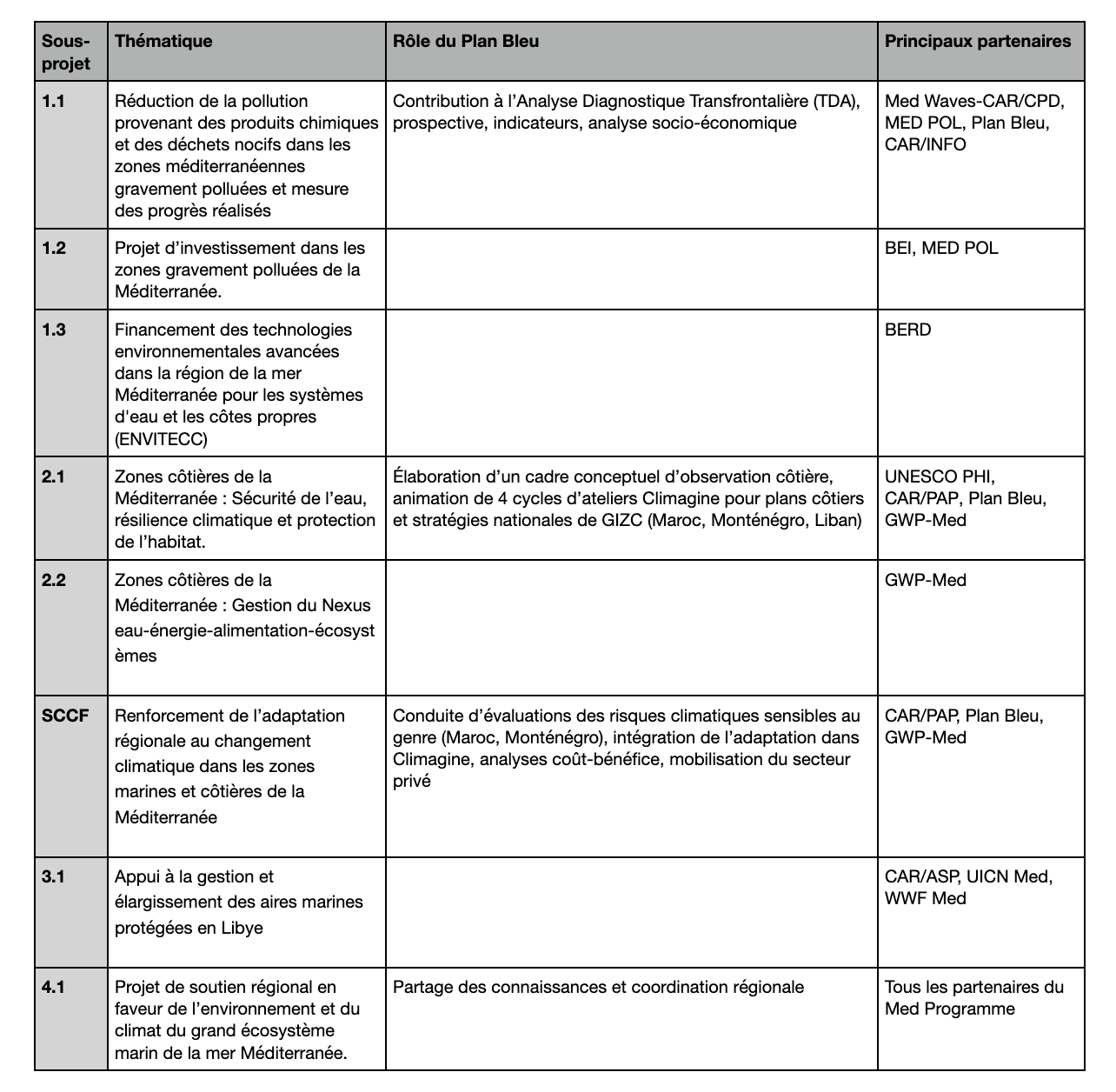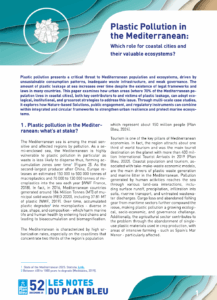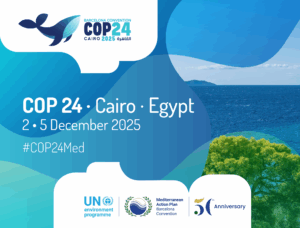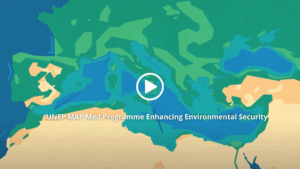
- Plan Bleu
Plan Bleu's missions
Make the Mediterranean a cooperation area for sustainable development
- themes
- projects
- Ressources
- publications
- Events
In the news
Last events
- Plan Bleu
Plan Bleu's missions
Make the Mediterranean a cooperation area for sustainable development

Providing socioeconomics insights for the appropriate management of Mediterranean resources

Facilitate a science – political and civil society interface

Supporting the transition towards a green and blue economy

Design possible futures for sustainable development

Observer of the environment and development to inform governments and the general public
- themes
- projects
- Ressources
- publications
- Events
In the news
Last events

GEF MedProgramme (2020-2024)
LINKS
PNUE/PAM (Agence d’exécution)
UNESCO/PHI
BEI
IUCN Med
GWP Med
WWF Mediterranean
PAP/RAC
SCP/RAC
SPA/RAC
The Mediterranean region is experiencing increasing environmental degradation due to:
- Increasing urbanization and tourism, which heighten pressure on water, food, and energy resources.
- Rising pollution, impacting coastal and marine ecosystems and habitats.
- Loss and degradation of ecosystems, and dwindling freshwater availability.
- The aggravating effects of climate change, particularly affecting the most vulnerable populations.
The MedProgramme is a structured response to these threats, building on the achievements of previous projects (MedPartnership, ClimVar, ICZM, etc.).
The MedProgramme (2020-2026) is a major regional initiative funded by the Global Environment Facility (GEF), with a budget of $43 million, implemented in ten Mediterranean countries: Albania, Algeria, Bosnia and Herzegovina, Egypt, Lebanon, Libya, Morocco, Montenegro, Tunisia, and Türkiye.
The programme is coordinated by UNEP/MAP (Mediterranean Action Plan) and is supported by a broad partnership of UN agencies, multilateral development banks (EBRD, EIB), regional activity centers (PAP/RAC, Plan Bleu, MedWaves, SPA/RAC, INFO/RAC), international NGOs (IUCN Med, WWF Med, GWP Med), and research institutes.
The MedProgramme aims to strengthen environmental security and climate resilience in the Mediterranean region by addressing key transboundary challenges: land-based pollution, sustainable water management, marine biodiversity protection, climate change adaptation, and gender mainstreaming.
Specifically, the MedProgramme aims to:
- Reduce transboundary environmental stress in coastal areas.
- Enhance climate resilience and water security.
- Improve the health and livelihoods of coastal populations.
- Integrate gender considerations into environmental management for equitable benefits for women and men.
The programme is structured around eight complementary child projects, organized into four operational pillars:
- Reducing pollution in priority coastal zones.
- Enhancing sustainability and climate resilience of coastal areas.
- Protecting marine biodiversity.
- Knowledge management, gender mainstreaming, and regional coordination.
Main Child Projects and Plan Bleu Contributions

Child Project 1.1: Reducing Pollution from Harmful Chemicals and Wastes in Mediterranean Hotspots and Measuring Progress to Impacts
Plan Bleu contributes to the development of the Transboundary Diagnostic Analysis (TDA), integrating its work on foresight, indicators, and socio-economic analysis. The Med2050 project feeds into the TDA through regional foresight analyses and the organization of workshops.
Child Project 2.1: Mediterranean Coastal Zones: Water Security, Climate Resilience and Habitat Protection
Plan Bleu, in collaboration with PAP/RAC, has supported the preparation of national Integrated Coastal Zone Management (ICZM) strategies, coastal plans, and methodological guidelines, particularly through the participatory Climagine foresight approach for climate change adaptation.
- Four Climagine workshops were organized at each pilot site (Tangier-Tetouan-Al Hoceima region in Morocco and Kotor Bay in Montenegro) to define 2050 visions, sustainability indicators, and strategic recommendations for coastal plans.
- All workshop reports and a final report have been published by Plan Bleu.
- In 2025, Plan Bleu recruited a team of experts in Lebanon to support the development of the new national ICZM strategy and the integrated management plan for Damour, with three participatory workshops planned through 2026.
- A Climagine methodological guide for ICZM practitioners will be published at the end of 2025, following a drafting phase and a technical workshop in Marseille in early 2026.
The Climagine methodology, developed and implemented by Plan Bleu, is based on a participatory approach to identify sustainability dimensions, define indicators, develop strategic diagrams, and formulate recommendations for coastal plans and national ICZM strategies. This approach fosters stakeholder engagement and the production of monitoring indicators for coastal sustainability.
Watch the video of the Coastal Plan/Climagine process in the Kotor Bay
SCCF Project: Enhancing regional climate change adaptation in the Mediterranean Marine and Coastal Areas
Plan Bleu conducted two gender-sensitive climate risk assessments at two pilot sites: Kotor Bay (Montenegro) and the Tangier-Tetouan-Al Hoceima region (Morocco), with the Montenegro assessment revised and translated into French in 2025. Gender indices (Gender-Development-Index and Gender-Inequality-Index) were used to produce maps published on Plan Bleu’s Observatory in 2025.
- Regional trainings on Nature-based Solutions (NbS) and Ecosystem-based Adaptation (EbA) were held in Kotor (October 2024) and Tangier (November 2024), with a participatory module based on the IUCN Global Standard’s 8 criteria for NbS.
- Results are synthesized in a report available in English and French.
- Two studies assessed Morocco’s and Montenegro’s capacity to mobilize finance for coastal adaptation. A webinar and a hybrid regional roundtable on financing and private sector engagement were organized in 2024. Results are summarized in the report “Mobilizing Finance for Coastal Adaptation in the Mediterranean”.
- Factsheet on the Project SCCF
NEWS
- “Gender-sensitive climate risk assessment of the Tangier-Tetouan-Al Hoceima region 2022” (EN version – FR version)
PUBLICATIONS CP 2.1
GEF MedProgramme (2020-2026) – Tanger-Tetouan-Al Hoceima Region:
- Workshop 2 (FR)
- Workshop 3 (FR)
- Workshop 4 (FR)
- Final Report (FR)
GEF MedProgramme FEM (2020-2026) – Bay of Kotor, Montenegro
- Workshop 2 (EN)
GEF MedProgramme FEM (2020-2026) – Damour Area and ICZM Law & Strategy, Lebanon
- Climagine Sustainability Indicators – Inception Report (EN)
- Rapid Stakeholder Assessment of the Damour Area (EN)
- Workshop 1 IMP Damour (EN)
- Workshop 1 ICZM Law & Strategy (EN)
Publications Projet SCCF
- Gender-sensitive climate risk assessment of the Tangier-Tetouan-Al Hoceima region 2022 (EN version – FR version)
- Gender-sensitive climate risk assessment of Kotor Bay, Montenegro (EN version – FR version)
- Application of the Multiscale Coastal Risk Index-Local Scale to Kotor Bay, Montenegro (EN version)
- Baseline study to appraise coastal adaptation interventions in Mediterranean coastal hotspots – Stage I (EN version)
- Catalyzing coastal adaptation finance in Montenegro – Rapid Capacity Assessment (EN version – FR version)
- Catalyzing coastal adaptation finance in Morocco – Rapid Capacity Assessment (EN version)
- Nature-based solutions and ecosystem-based adaptation in the Mediterranean (EN version)
- Mobilizing Finance for Coastal Adaptation in the Mediterranean. Webinar and Regional Roundtable Report. (EN version)
Publications
events
News
Subscribe to the newsletter
Subscribe to Plan Bleu’s newsletter to stay updated



-
Plan Bleu
Tour la Marseillaise
2 bis, Boulevard Euroméditerranée
Quai d'Arenc
13002 Marseille - France - [email protected]
- +33 (0)6 43 08 20 23








